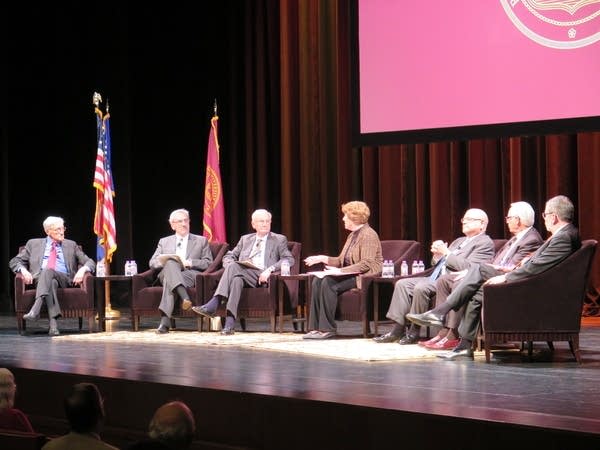How past U of M presidents view higher-ed today

Six University of Minnesota president from over the past 40 years gathered Monday to talk about current higher-education issues and how the U might navigate them today.
• Listen to the discussion here.
For two hours in Northrop Auditorium, Star Tribune columnist Lori Sturdevant moderated a conversation among Eric Kaler, president since 2011, Robert Bruininks (2002-11), Mark Yudof (1997-2002), Nils Hasselmo (1988-1997), Kenneth Keller (1985-1988) and C. Peter Magrath (1974-1984).
Judging from their statements, lots of today’s concerns – state funding, academic freedom, and the quality of undergraduate education – weighed on the minds of many of them years ago.
Create a More Connected Minnesota
MPR News is your trusted resource for the news you need. With your support, MPR News brings accessible, courageous journalism and authentic conversation to everyone - free of paywalls and barriers. Your gift makes a difference.
It was a meandering discussion – much of which covered old ground for On Campus readers – but the most interesting topics revolved around changing support for higher education.
Below are a few of the most interesting tidbits.
Magrath on funding the university:
“The financial landscape … of support for American higher education … is extraordinarily [more] difficult than it was when I was first president here, and I’d suspect for in many ways the people that succeeded me. The amount of state money that goes into the U today … is not much, it has been going down, and pardon my English, it ain’t gonna go back up in any forseeable future. We are in difficult financial straits if we’re going to continue to perform our service to the public and the people. That means … universities have got to be extraordinarily resourceful not only in getting money from donors and trying to control costs … we have to generate resources, in my judgment, by getting into relationships with business and industry. It can be done without selling your soul.”
Yudof on how demographics have changed support for higher ed:
“There’s an asymmetry. Everybody believes higher education is important, and almost no one wants to pay for it. Part of it is an aging demographic. If you think of the priorities – and I’m not against any of these things – but we have pharmaceuticals for the elderly, we have Social Security, we have Medicare and Medicade and [public safety] – things like that. So the shine isn’t quite on higher ed the way it was in the ‘50s. There are competing priorities. And the competing priorities increasingly get resovled by an electorate that is increasingly aging. … And part of it is a certain skepticism: ‘We change. Why don’t you? … We don’t that way in Lockheed, we don’t do it that way in the airline business.”
Hasselmo on the diminished voice of universities:
“There has been this wave of anti-intellectualism in the country, and … the universities have somehow ended up on the sidelines in this whole debate. You have this overheaded debate of climate change and the climate change deniers. We have [debate over the relative safety of] vaccination, creation science. We have a whole plethora of issues here. … We have a new intellectual environment because of the internet. We as universities have to direct ourselves to this massive flow of mis- and disinformation. … And it also raises the question: Have we somehow failed in liberal education, in providing students with an ability of critical thinking?”
Hasselmo on how other countries might beat the U.S. at its own higher-ed game:
“We [in Sweden] came here because the notion was that in America you had the best higher education system in the world, and that you had research being conducted [integrated with] a broad spectrum of teaching. And today what to we see in Abu Dhabi and Dubai and in China? They are researching massively in their research universities. And by the way they’re doing it on something that looks suspiciously like the land-grant model: research, teaching and service. And they may be outflanking us if we do not continue to make that investment in what really was an American invention – the research university combined with teaching and service.”
Keller on the university’s need to assert its value as a public good:
“There needs to be some pushback. This notion that higher education is a private good, rather than a public good, is devastatingly bad. There’s no way to live with that notion and continue to be an effective educational institution. … It happened when we went into a financial crisis a few years ago, which was quite real. Under [those] circumstances, budgets had to be cut, and the university had to take its lumps along with it. But … people in the political sphere wanted to justify what they were doing by more than the fact that we were out of money, and so they said it’s easy to make the argument that, ‘Anyway, [higher education] is a private good.’ So you recover financially, but you’re left with this philosophical change.”